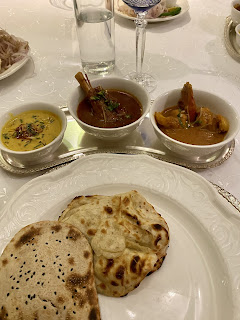#blahvsfood goes to the original Dum Pukht
My friend Anoothi Vishal, who is one of India’s greatest writers about food and whose opinion I trust completely, always insists that Dum Pukht is one of India’s greatest restaurants. I remember an awards ceremony where we were on the same jury when she fought hard for her belief that it was a culinary treasure that deserves greater recognition. At that time I lived in Mumbai and my experience of Dum Pukht was based on meals at their outlets in Bangalore, Mumbai and Koltaka and I didn’t agree with her. They were all very good but one of India’s five or ten greatest restaurants? I didn’t think so. That is when she explained that when she referred to Dum Pukht, she meant the original one at ITC Maurya Sheraton, the mother lode where it all began.
I had decided that I had to go and eat there as soon as I could (ideally with Anoothi) and experience it for myself and when I decided to go to Delhi after 19 months it was one of the first places on my list. Sadly Anoothi was busy running around on a project but ITC Hotels was kind enough to host me and organise a proper tasting of some of Dum Pukht’s best dishes. Making the evening even more special was Chef Azaan Qureshi, the third generation of the Quereshi family at Dum Pukht who came in on his day off just to be able to supervise my meal and spent time explaining the meal.
I don’t know if there is any point in my talking about the dishes themselves. These dishes have stood the test of time for close to half a century. There is a reason why Imtiaz Qureshi won the Padma Shri. Why Gulam Qureshi is a legend and an inspiration. This is cooking of the highest order. Subtle, refined, timeless, skilful. The apogee of a culinary heritage that goes back centuries. Every single bite is perfect and the result of thought and consideration. And it’s not just the about the taste. It is literally a feast for the senses. Whether it is aroma or texture, the visual magic of a purdah being broken, or how the dishes flow into each other, or even how the elements within a dish interact with each other, the char on a kebab, the choice of bread, the tang of a salan, the cut of lamb… everything has a reason and a thought behind it.
Chatting with Azaan and listening to the story of his family, I felt a sense of awe and wonder. To think of this simple caterer from Lucknow, a man uneducated in the traditional sense, coming to Delhi half a century ago to open first Bukhara and then Dum Pukht, restaurants that have shaped and influenced Indian food like no others, restaurants that have fed American Presidents and African Nobel Laureates, British rock stars and Turkish authors… a man who is the first chef to win a Padma Shri and man who won awards as one of the world’s greatest restaurants… his life and journey are truly extraordinary, cinematic in its narrative arc.
As Azaan was saying, in many ways Imtiaz Qureshi invented modern Indian food. I have written earlier that Bukhara and Dum Pukht were the restaurants that first made the global culinary world take Indian food seriously. He was able to present Indian food in a way that the world was forced to recognise the skill and technique in the cooking, the elegance in the plating and the sophistication of its flavours. I consider it a privilege to have been able to spend time and be fed by the third generation of this great family and I hope to see this great institution continue to be a torchbearer for Indian and Awadhi food for decades to come.






Comments